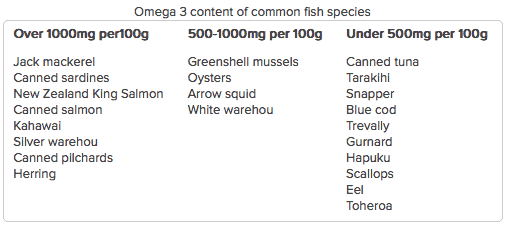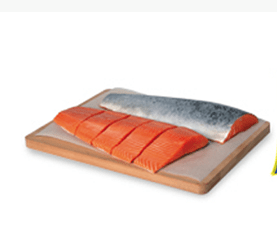Omega-3 fats are an essential nutrient, but it’s a nutrient that many of us do not get enough of in our diets. Omega 3 fats are an integral part of our cell membranes, therefore they influence many different areas of health. The strongest evidence for omega 3 fats is their role in preventing heart disease and also possibly stroke.
Omega 3 fats have anti inflammatory properties. Because inflammation is implicated in a range of conditions, omega 3 fats have potential benefits for a wide range of health issues including insulin resistance, inflammatory bowel disease, and other autoimmune diseases such as lupus and rheumatoid arthritis. They have a role in maintaining eyesight and there is also evidence that omega 3 fats are important for mood and mental health.

Image from here
There are plant based and marine based omega 3 fats. Marine based omega 3 fats are known as EPA and DHA for short (long names = Eicospanentaenoic acid (EPA) and Docosahexaenoic acid (DHA)). Research shows that these omega 3 fats are more important for health, although plant based omega 3 fats are still important.
The plant based omega 3 fat is alpha-linolenic acid (ALA). Some of this is converted EPA and DHA but it’s only a small amount. So while plant based omega 3 fats are an important addition to the diet, it’s your EPA and DHA from marine sources that we need to include the most.
The best sources of omega 3 fats are oily fish, but other seafood, such as mussels, oysters and arrow squid also provide an useful source. This table illustrates the omega 3 content of seafood provides omega 3 fats.
 Table from here
Table from here
How much should I eat?
The recommended intake of omega 3 fats is 500mg a day, or 3500mg a week.
This can be achieved by eating 2-3 serves of oily fish a week or other seafood rich in omega 3 fats, as well as including some plant based sources of omega 3 fats .
Fresh salmon is a delicious way to get your omega 3 fats, but if it’s not in your budget then canned is also an excellent source. 150g of canned salmon contains approximately 2110mg, so including this twice a week in your diet is an easy way to get your intake. I enjoy this at lunch time, or sometimes make  salmon fish cakes. Tinned tuna is another source, but it contains less omega 3 fat than salmon. Check the nutrition label to find one with the highest levels.
salmon fish cakes. Tinned tuna is another source, but it contains less omega 3 fat than salmon. Check the nutrition label to find one with the highest levels.
Plant based sources of omega 3 fats include linseeds (also known as flaxseed), walnuts and chia seeds. You can add ground linseed, chia seeds or LSA (a mix of linseed,sunflower and almonds, ground) to smoothies or on yoghurt or have a handful of walnuts as a snack.
What about mercury?
Fish can contain mercury from environmental pollutants. However, you can safely eat 2–3 serves a week of most types of fish. Some types of fish do need to be limited, especially for pregnant women. Shark (Flake), Billfish, (Swordfish / Broadbill/Marlin) Orange Roughy and Catfish are some of these. You can read more about it here.
What about sustainability?
There are some good options for sustainable fish that are rich in omega 3 fats. This is a fantastic visual guide to the best sustainable fish choices in NZ, produced by Forest and Bird. Sardines are also a good sustainable fish source.


Leave a Reply